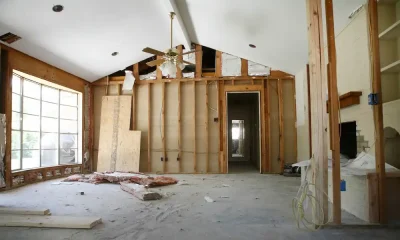Sell
Mastering Property Sales: Strategies For Home Sellers

Selling a property can be an incredibly stressful experience for homeowners, as it is often their most valuable asset.
The pressure to find the right buyers and negotiate the right price can cause stress levels to skyrocket.
The stress is primarily caused by the significant value of the asset and the infrequency with which homeowners typically sell their homes. The first time selling a home is a memorable experience for most people – often for the wrong reasons.
The property sales process is complex, requiring more than just putting up a ‘For Sale’ sign. It helps when you have a team of experts with experience, knowledge of the market, and a touch of finesse in presentation and negotiation.
Do you want a home that lingers on the market or sells promptly at a premium?
This property blog delves into what it takes to sell a home for a reasonable price in good time.
A Seller’s Blueprint
As a home seller, preparation is your bedrock. This phase is not just about sprucing up your property; it involves a comprehensive plan that includes market analysis, home improvements, and strategic pricing.
Getting this foundation right can significantly ease the selling process, often resulting in a quicker sale at a better price.
The journey of selling your home is fraught with potential missteps. One error is ignorance of how the sales process works and what factors play a role in the real estate market.
Research
Do some rudimentary research on the sales in your area. Note that the sales prices for homes are similar to yours.
Various factors influence the real estate market, including economic indicators, buyer demographics, and technological advancements.
Being well-informed and responsive to these trends can empower sellers with the strategies needed to navigate the market confidently and effectively.
Understanding Economic Indicators
Economic indicators profoundly impact property sales, affecting everything from buyer demand to mortgage rates.
For instance, buyers may be more incentivized to purchase homes at low-interest rates, potentially creating a seller’s market.
Keeping an eye on these trends through reliable financial news sources can inform timely decisions. It’s also helpful to consult with a real estate agent who understands how broader economic conditions influence local market sentiment and pricing trends.
Overpricing
Another common mistake is overpricing, which can deter potential buyers and lead to a stale listing. Read on for tips on how to avoid overpricing.
Market Analysis and Home Valuation
Comparative market analysis is crucial in setting a realistic price that reflects the current market conditions.
For example, a home priced right at market value can attract more interest and possibly incite a bidding war. In contrast, an overpriced home may not generate any offers, causing the property to languish on the market.
Tip
Before you get your home valued, refresh rooms that need it. Use neutral colors and furnishings and declutter your items.
We recommend going further for the photos and viewings to get the property valuation you want.
Stage your home using an interior designer. Their brief is to create a home that can attract a vast pool of prospective buyers. This action will also improve the valuation of your home from which you set the listing (sales) price).
In a market where every detail counts, enhancing the value of your home is an intelligent strategy for attracting interest and maximizing return.
The right improvements make a property more attractive to potential buyers and can significantly increase its price.
Upgrading Key Areas
Investing in crucial home areas—like the kitchen and bathrooms—can yield substantial returns.
Updated appliances, fixtures, and modern designs in these spaces can appeal to buyers looking for move-in-ready homes.
It’s crucial to focus on upgrades that offer the best bang for your buck; for instance, a minor kitchen remodel can recoup a significant portion of the investment compared to a full-scale renovation.
Emphasizing Energy Efficiency
With growing awareness of environmental issues and rising energy costs, energy-efficient home features have become highly desirable.
Installing LED lighting, double-pane windows, or high-efficiency HVAC systems can be compelling selling points.
These features appeal to buyers’ sense of eco-friendliness and promise long-term savings, making them an attractive investment for future homeowners.
Marketing Matters
In the digital age, your home’s online presence is where most prospective buyers will see it first. This is why the imagery of your house needs to be first-rate, showing its best features in the best light.
Effective marketing goes beyond listing on popular real estate websites; it requires a mix of professional photography, engaging virtual tours, and targeted social media campaigns to reach potential buyers.
A well-marketed home captures attention and draws visitors virtually and in person. Use an expert to take the video and images.
Embracing Technological Tools
Technology has revolutionized property sales, from 3D home tours to algorithm-driven pricing strategies. Sellers who embrace these tools can significantly broaden their reach.
Online platforms offer data, such as comparable sales and buyer activity, which can be leveraged to optimize pricing and marketing tactics.
Utilizing these tools effectively can mean the difference between a property that sells quickly at a favorable price and one that does not.
Use technology like a drone for an aerial view. Ensure your roof is in good condition and your outdoor spaces are primed for curb appeal.
Boosting Curb Appeal
The adage “first impressions last” holds particularly true in real estate.
A home with strong curb appeal can catch a buyer’s eye and set the tone for the entire viewing experience.
Simple updates like fresh exterior paint, a well-manicured lawn, or updated landscaping can significantly enhance a property’s external allure.
These changes don’t have to be expensive but can offer significant returns regarding property attractiveness and perceived value.
Catering To Buyer Demographics
The target buyer demographic can significantly shape your selling strategy.
Millennials, now the largest homebuyers, tend to value smart homes with energy-efficient features and flexible spaces.
Sellers can recognize these preferences and tailor their home’s features and marketing strategies to appeal to this demographic.
Doing so can increase their home’s appeal and possibly even its final sale price.
Closing With Competence
Finally, when offers begin to roll in, understanding the nuances of negotiation and the closing process is pivotal.
This stage requires skillful negotiation to secure a favorable deal while maintaining a good rapport with the buyer.
Familiarity with closing procedures, including inspections, appraisals, and legal requirements, ensures a smooth transition to the final sale and avoids last-minute hitches that could jeopardize the deal.
Avoid attempting to do this on your own. Selling a home takes teamwork. Use your realtor, lawyer, accountant, and anyone else you believe will add value to the negotiation process for the sales transaction.
Key Takeaway
Mastering the art of property sales as a home seller demands more than just putting up a listing; it requires strategic preparation, market insight, and targeted home improvements.
Sellers can effectively navigate the complexities of the real estate market by avoiding common mistakes, staying informed about market trends, and enhancing the home’s value through thoughtful upgrades.
As sellers apply these strategies, they position themselves advantageously to maximize returns and ensure a smoother, more profitable sale process.
In the dynamic landscape of property sales, being proactive, informed, and strategic separates successful sales from the rest.






